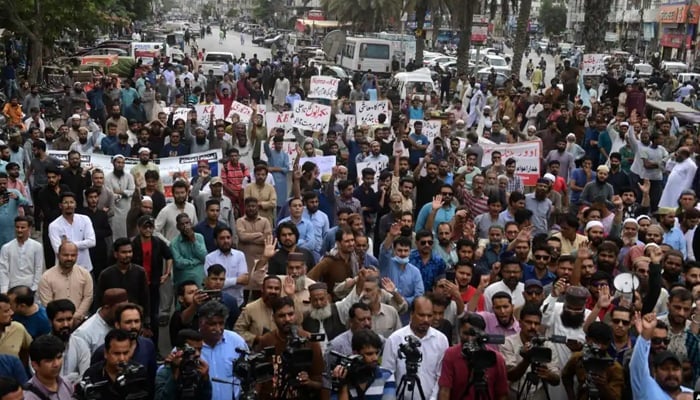Teachers’ protests
During the month where countries celebrate ‘Teachers’ Day’ to pay respect to teachers for their contributions, public-sector teachers in Pakistan are out on the streets in various cities, fiercely demanding the restoration of several pay-related facilities. Teachers are also strongly against the caretaker government’s decision to privatize most public schools and the changes made to pension regulations; they also want authorities to roll back leave-encashment facilities awarded to them. Instead of lending a sympathetic ear to their demands, the government has ordered the use of force against them. On Thursday (Oct 19), the police in Lahore arrested over 100 teachers, lady health workers and other government employees who were protesting against the brutal changes made in their pension and pay packages. This came days after the police arrested 126 teachers for protesting for their rights. In Bahawalpur, the police booked around 200 teachers for holding a protest.
Government jobs in the country are still revered, and people go through a recruitment test to get selected for these coveted positions. During their tenure, their salaries are generally lower than what many private schools offer. But they keep up with it mostly because of the post-retirement benefits, which help a lot of teachers to lead a respectable life when they are too old to earn. But such pension schemes seem a burden to economists who want people to remain committed to the ‘hustle culture’ forever.
At the centre of the debate is the battle between pro-people policies and an elite that has very little to do with the people it claims to represent. Government after government has cracked down on protesting teachers, LHWs, nurses, young doctors -- you name it and the government has targeted the middle-tier professional class. On top of it all, privatization plans are often made hurriedly and to relieve the government from its responsibility. In this case, such plans are coming from a caretaker government, which is not representative of the people. Such decisions need parliamentary debates so that all aspects are covered, and a solution is suggested to counter the resulting disagreement of the people affected. Plans made behind the closed doors without any input from people’s representatives are usually divorced from the nuance required to tackle such situations. The voice of teachers matters a lot, and it is the responsibility of the authorities concerned to listen to the fears and demands of teachers and work out a solution. Protest is a right of all citizens – and the beauty of democracy. All restructuring plans must be discussed with all the stakeholders involved so that a cohesive strategy is formulated. Teachers are the foundation of any society, and it is important to stay away from decisions or plans that are disrespectful to this highly respected profession. That said, there is also a real issue of untrained teachers in the public sector; it is on the government to train them, pay them, and not arrest them.
-
 Jennifer Hudson Gets Candid About Kelly Clarkson Calling It Day From Her Show
Jennifer Hudson Gets Candid About Kelly Clarkson Calling It Day From Her Show -
 Shamed Andrew Was With Jeffrey Epstein Night Of Virginia Giuffre Assault
Shamed Andrew Was With Jeffrey Epstein Night Of Virginia Giuffre Assault -
 Shamed Andrew’s Finances Predicted As King ‘will Not Leave Him Alone’
Shamed Andrew’s Finances Predicted As King ‘will Not Leave Him Alone’ -
 Bad Bunny Faces Major Rumour About Personal Life Ahead Of Super Bowl Performance
Bad Bunny Faces Major Rumour About Personal Life Ahead Of Super Bowl Performance -
 Sarah Ferguson’s Links To Jeffrey Epstein Get More Entangled As Expert Talks Of A Testimony Call
Sarah Ferguson’s Links To Jeffrey Epstein Get More Entangled As Expert Talks Of A Testimony Call -
 France Opens Probe Against Former Minister Lang After Epstein File Dump
France Opens Probe Against Former Minister Lang After Epstein File Dump -
 Last Part Of Lil Jon Statement On Son's Death Melts Hearts, Police Suggest Mental Health Issues
Last Part Of Lil Jon Statement On Son's Death Melts Hearts, Police Suggest Mental Health Issues -
 Leonardo DiCaprio's Girlfriend Vittoria Ceretti Given 'greatest Honor Of Her Life'
Leonardo DiCaprio's Girlfriend Vittoria Ceretti Given 'greatest Honor Of Her Life' -
 Beatrice, Eugenie’s Reaction Comes Out After Epstein Files Expose Their Personal Lives Even More
Beatrice, Eugenie’s Reaction Comes Out After Epstein Files Expose Their Personal Lives Even More -
 Will Smith Couldn't Make This Dog Part Of His Family: Here's Why
Will Smith Couldn't Make This Dog Part Of His Family: Here's Why -
 Kylie Jenner In Full Nesting Mode With Timothee Chalamet: ‘Pregnancy No Surprise Now’
Kylie Jenner In Full Nesting Mode With Timothee Chalamet: ‘Pregnancy No Surprise Now’ -
 Laura Dern Reflects On Being Rejected Due To Something She Can't Help
Laura Dern Reflects On Being Rejected Due To Something She Can't Help -
 HBO Axed Naomi Watts's 'Game Of Thrones' Sequel For This Reason
HBO Axed Naomi Watts's 'Game Of Thrones' Sequel For This Reason -
 King Charles' Sandringham Estate Gets 'public Safety Message' After Andrew Move
King Charles' Sandringham Estate Gets 'public Safety Message' After Andrew Move -
 Lewis Capaldi Sends Taylor Swift Sweet Message After 'Opalite' Video Role
Lewis Capaldi Sends Taylor Swift Sweet Message After 'Opalite' Video Role -
 Brooklyn Beckham Plunges Victoria, David Beckham Into Marital Woes: ‘They’re Exhausted As It Seeps Into Marriage
Brooklyn Beckham Plunges Victoria, David Beckham Into Marital Woes: ‘They’re Exhausted As It Seeps Into Marriage




